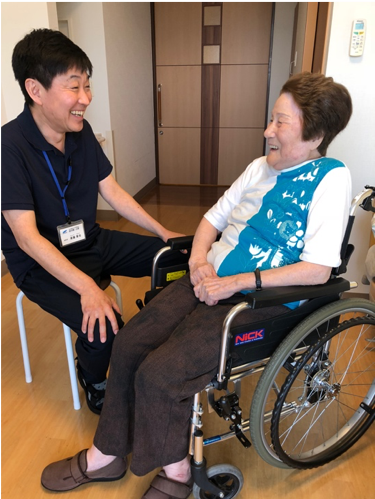Japan’s economy enjoyed rapid growth from the late 1950s to the 1970s, and the country underwent an unprecedented process of urbanization that fundamentally altered the family structure as it produced more nuclear families. With the aging of Japanese society since the 1970s, the number of seniors who require constant caregiving has grown. But as families are unable to provide the care they need, a system of long-term care insurance was introduced, providing publicly operated long-term care facilities for seniors. There are now approximately 13,000 such facilities throughout Japan.
One such facility, Mori no Kaze–Uehara, opened in 2013 in Tokyo’s Yoyogi-Uehara district. Its policy is “to help clients, whether in the community or at the facility, so that they can continue to live in the way they are accustomed to living at home.” To do so, they provide a variety of support services to help seniors lead an independent life.
One factor that can impede a person’s ability to age at home is something called “disuse syndrome,” which refers to the changes that occur in a person’s mind and body if there is a significant drop in activity level as they age. Disuse syndrome often results from simply not using one’s existing mental and physical functions—for example, if a person is capable of walking but never walks, they begin to lose muscle and eventually are no longer able to walk. For that reason, Mori no Kaze focuses in particular on improving its residents’ physical functions, excretory functions, and wakefulness as a way to minimize disuse syndrome.
Many of the seniors residing in long-term care facilities use adult diapers in their daily lives. At Mori no Kaze, residents begin living without diapers from the first day they arrive. There are times when people suffer from incontinence at first, but with the specialized assistance of a formal caregiver, residents go to the bathroom at regular intervals and are able to go without diapers throughout the day. In addition, in order to ensure that people are seated in an appropriate position and can use abdominal muscle pressure to evacuate their bowels when using the toilet, they have developed their own device, “Toire de funbaru-kun,” that helps the user maintain the proper position.
When an elderly person needs nursing care, they tend to spend a large portion of the day sitting or lying in bed. Mori no Kaze has introduced regular group exercises using a training machine. In addition, caregivers and physical therapists work together to have residents practice walking, tracking the distance walked each day. They also record and track daily fluid intakes to improve residents’ wakefulness during the day. These efforts allow the residents to make full use of their “usable” physical functions and to live more independently. As the director of the facility, Mr. Takaya Saito, explains, “Many people are bedridden when they come to our facility. But six months later they are walking to the bathroom themselves and can sit and eat meals without any help. But best of all, they spend more time smiling. Some even return to their homes.”
Mori no Kaze also offers an option that provides seniors with the ability to alternate between their home and the facility. They enter the facility for a short period of three months and receive specialized, intensive training that is focused on regaining their ability to live independently. Then, they go back home; if they need further help, they can always come back to the facility. By providing guidance on caregiving methods not only to the individual but to family members as well, Mori no Kaze–Uehara plays a leading role in supporting people’s ability to age in place. In addition, the facility has opened its training room to seniors living in the community and offers lectures and physical exercise led by professionals. By doing so, they are improving health awareness among the local seniors in the community.


